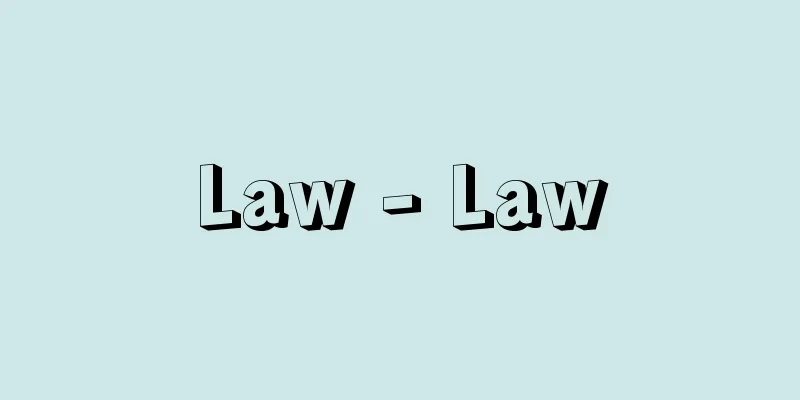Law - Law

|
〘Noun〙[一] (Hafu:)① Laws and rules. National law and criminal law. Discipline to be followed. Rules. Ordinances. [On-Kun Shinbun Jihen (1876)] [Zhuangzi - Xu Wugui]② Rules established or approved by the ruler. A norm of social life that has coercive power to maintain social life. ※Shoku Nihongi - Wadou 2nd year (709), October Heishin "Prohibitions, the peasants of Kinai and Omi Province must not fear two laws " ③ A form of written law that is established after a resolution by the Diet. It is proposed by a member of the Diet or the Cabinet, and promulgated after being passed by both houses. It has priority over orders and regulations, second only to the Constitution. ※Western Affairs (1866-70)〈Fukuzawa Yukichi〉2 "The human body is〈abbreviated〉a person who establishes laws with human wisdom and acts in accordance with these laws"④ The study of ③. Jurisprudence. Law. *Fuzoku Gaho, Issue 244 (1902), Keio Gijuku, "First, I will teach the three subjects of literature, law, and finance." [2] (Hof:) Buddhist term. 1. ("Dharma" is the truth preached by the Buddha. "Rin" is the rules of life established by the Buddha) Two things that establish Buddhism. That is, the teachings of the Buddha and the rules he established. *Konjaku (around 1120): 1. "I wish to receive the Buddha's law and become a monk." 2. The precepts established by the Buddha. Refers to the Hinayana precepts and Mahayana precepts. *Shobogenzo (1231-53), Monkhood: "Beginner's entry into the world, not yet able to recite the law." Source: The Selected Edition of the Japanese Language Dictionary About the Selected Edition of the Japanese Language Dictionary Information |
|
〘名〙[一] (ハフ:)① 法と律。国法と刑律。のっとるべき規律。のり。おきて。〔音訓新聞字引(1876)〕 〔荘子‐徐無鬼〕② 統治者が制定または認定した規則。社会生活維持のために強制力をもつ社会生活の規範。※続日本紀‐和銅二年(709)一〇月丙申「禁制、畿内及近江国百姓、不レ畏二法律一」③ 国会の議決を経て制定される成文法の一形式。国会議員または内閣により提案され、両議院の可決ののち公布される。憲法に次いで、命令や規制に優先する効力をもつ。※西洋事情(1866‐70)〈福沢諭吉〉二「人為の身とは〈略〉人智を以て法律を設け此法律に従て進退するものを云ふ」④ ③を研究する学問。法学。法律学。※風俗画報‐二四四号(1902)慶応義塾「先づ文学、法律、理財の三科を教授し」[二] (ホフ:) 仏語。① (「法」は仏陀の説いた真理。「律」は仏陀の制定した生活規定) 仏教を成立させる二つのもの。すなわち仏陀の教えと定めたきまり。※今昔(1120頃か)一「願くは我、仏の法律を受け出家せむと思ふ」② 仏が制定した戒律。小乗戒や大乗戒などをいう。※正法眼蔵(1231‐53)出家「初心入道、法律未レ諳」
出典 精選版 日本国語大辞典精選版 日本国語大辞典について 情報 |
<<: Law Evasion - Houritsukaihi
>>: Profiteering - profiteering
Recommend
scombrine
…A general term for a group of water-soluble simp...
Serpentine plant - jamonganshokubutsu (English spelling) serpentine plant
It is known that special plants grow in serpentine...
Rotorcraft - Rotorcraft
A type of aircraft that is heavier than air and c...
Heterosexual - Hentai
...Neometabolism is seen in the Hemiptera (Homopt...
Isherwood, JW
…This was the prototype of modern tankers, and wa...
Ivo
…the treaty between Holy Roman Emperor Henry V an...
Troitsk na Taganroge (English spelling) TroitsknaTaganroge
…Population: 292,000 (1993). Formerly known as Tr...
Itasenpara - Itasenpara
... In Japan, there are two species that have bee...
Gurnard (Chelidonichthys spinosus)
A marine fish of the family Scorpaeniformes and fa...
Settlement area - teijuken
The Third Comprehensive National Development Plan ...
Star-nosed mole
It is an animal of the family Tallidae in the ord...
Hobbema - Mindert Hobbema
Dutch landscape painter. Born and died in Amsterd...
Scam - Scam
It means to deceive someone (to make them believe...
Pointe
…The first male dancer is the Premier Dansour. Po...
Prohibition - ban
… In the process of the complete revision of the ...









